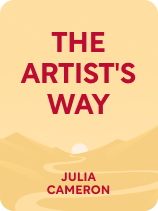

This article is an excerpt from the Shortform book guide to "The Artist's Way" by Julia Cameron. Shortform has the world's best summaries and analyses of books you should be reading.
Like this article? Sign up for a free trial here.
Are you your own worst enemy? Do you tend to make excuses for why you’re not pursuing your dreams?
In her book The Artist’s Way, Julia Cameron shares practical advice on how to overcome limiting beliefs: ground yourself, disprove your belief, and use positive affirmations. Although her book is aimed at artists, her advice on this topic can apply to anyone.
Keep reading to get the details on Cameron’s advice.
Overcoming Limiting Beliefs
Cameron says many artists block themselves with limiting beliefs—for example, they believe they’re not good enough or are too old, or they focus on regrets or future uncertainties. Whenever you find an excuse or reason for not taking action to achieve your artistic destiny, you’re engaging in some form of limiting belief. Let’s look at Cameron’s three pieces of advice on how to overcome limiting beliefs.
(Shortform note: In Steal Like an Artist, Austin Kleon explains that these types of limiting beliefs often stem from imposter syndrome—the persistent feeling that you’re not talented enough to succeed and that acting otherwise makes you an imposter. Kleon says that one way to overcome this and start creating art is to recreate the work of artists you admire. This will help you learn and understand their techniques so you can apply them to your own work.)
#1: Ground Yourself
First, Cameron advises that you ground yourself—pay attention to the beauty of your surroundings, the present moment, and what you can be grateful for. Grounding yourself will help you avoid giving attention to thoughts about the past or future that may discourage you from taking positive action.
(Shortform note: In Seeking Wisdom, Cameron emphasizes this point as a staple of her six-week program for maximizing creativity. She refers to the concept—paying attention to the present and appreciating life—as offering “prayers of gratitude” to your God concept (the creative force). To do so, she recommends initially paying attention to and being grateful for the beauty of nature and your environment. Then, get more specific and express gratitude for the people in your life by writing them letters of thanks. Finally, express gratitude for any life-changing events and synchronicities you’ve experienced by writing down what happened and how it positively impacted you.)
#2: Disprove Your Belief
Second, writes Cameron, seek out information that disproves your limiting belief. For example, if you think only rich people can produce the type of art you want to focus on, look up stories about successful artists who struggled financially.
(Shortform note: In Awaken the Giant Within, Tony Robbins reiterates overcoming limiting beliefs by disproving them, and he offers a few specific questions you can ask to do so. For example, you can ask: In what ways is this belief ridiculous? Who did I learn this from and are they a worthy role model?)
#3: Use Positive Affirmations
Finally, Cameron recommends using positive affirmations to override your limiting beliefs. To do so, notice when a limiting belief crops up, create an opposing positive affirmation, and write it down 10 times in a row. For example, if you want to start a mural but notice your mind telling you “you’ll never finish, you’re not dedicated enough,” form a positive affirmation like “I’m a passionate artist, and I’m dedicated to completing a mural that will inspire others.”
(Shortform note: To make your affirmations even more effective, try speaking them aloud—experts say doing so may be more useful in overcoming limiting beliefs for a few reasons. First, speaking aloud activates the pleasure center of the brain, which makes you more likely to feel calm and positive. Further, reciting affirmations aloud forms “auditory links” within your memory—this instills the affirmation into your subconscious and makes you more likely to remember it when a relevant situation arises. So, if you regularly tell yourself aloud that you’re a dedicated and inspirational artist, this belief will be more likely to arise when you create art.)

———End of Preview———
Like what you just read? Read the rest of the world's best book summary and analysis of Julia Cameron's "The Artist's Way" at Shortform.
Here's what you'll find in our full The Artist's Way summary:
- How you can overcome obstacles and blocks to reach your creative potential
- An overview of Julia Cameron's 12-week program on accessing the creative force
- Why many artists fall into addictions and how to resist them





